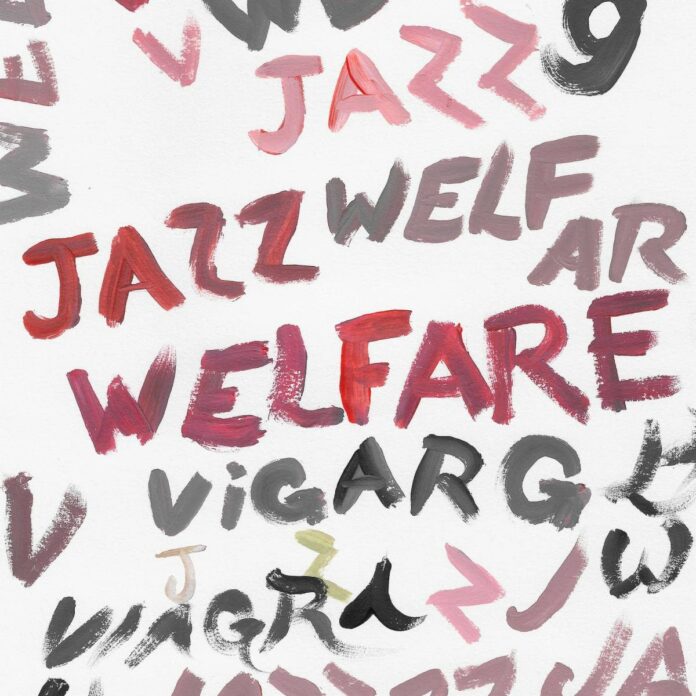When Viagra Boys burst onto the scene half a decade ago, it was hard not to view their whole act as a bit of a joke. From their name to their over-the-top performances, however, the music world seemed to agree it was a pretty smart joke – a send-up of toxic masculinity and classism deftly buried in layers of sarcasm, post-punk filth, and even a hint of sincerity, all culminating in their blistering 2018 debut, Street Worms. To an extent, the Stockholm five-piece seemed to be feeding that narrative, too, describing their name as “a comment on the failed male role in today’s society.” That ambivalence hasn’t gone away on their follow-up, Welfare Jazz, though this time, frontman Sebastian Murphy gave a different explanation than one might have expected when asked about the album’s title: rather than an obvious dig at the elitism of the institutionalized arts world, he suggests it doesn’t really have any politics behind it beyond the fact that it just “sounded cool.”
Though absurdist imagery and wild humour still find a way of seeping into every corner of the album, Viagra Boys seem to be downplaying the undercurrent of irony that might have previously been overstated to instead focus on the real darkness that permeates these narratives. Welfare Jazz finds Murphy eschewing the political to zero in on a number of issues beginning with the prefix “self” – self-absorption, self-hatred, self-aggrandizement – depicting them less as endlessly recurring cycles than part of a kind of continuous descent into a drug-fuelled, bottomless pit of despair. The way the record kicks off is almost misleading: opener ‘Ain’t Nice’ channels the kind of fist-pumping energy that’s designed to get a crowd riled up, but despite its swaggering riffs and chirpy synths, it’s hard to overlook the song’s uneasy subtext, the pent-up frustration boiling underneath its playful admission of recklessness. On the strangely country-inflected ‘Toad’, the narrator’s commitment to a hedonistic lifestyle appears to almost be a bleak way of sealing his fate: “I’m never gonna be the man you want me to be/ I’m a rebel till I die,” Murphy proclaims. It’s the kind of song that would benefit from being stretched out in a live setting, as Viagra Boys are wont to do, but here, limited to a cruelly tight three-and-a-half-minute runtime, it loses some of its potential impact.
The album’s crucial turning point arrives on ‘Into the Sun’, a moment of self-actualization where the feelings of loneliness and regret begin to rise to the surface: “What kind of person have I become?/ The ghost of an outlaw who was captured and hung,” he laments before vowing to change for the better. But it’s a promise that rings hollow, partly because it’s delivered in the same scorching, manic wail that sizzles through tracks like the deceptively titled ‘I Feel Alive’, and partly because follow-up ‘Circles’ confirms the narrator has far from escaped the downward spiral of addiction, even if Murphy’s cleaner vocals hint at a more sobering perspective. At this point in its narrative progression, ‘6 Shooter’ is exactly the kind of instrumental break the album needs, its relentless cacophony the only way of really encapsulating the chaos that lurks underneath.
It’s in the latter half that Welfare Jazz starts to lose focus, even as it contains some of the album’s most musically compelling tracks. As the barroom blues cut ‘I Feel Alive’ vacillates between a sense of reclamation and self-parody, the song’s presentation seems to veer towards the latter, negating any real sense of catharsis; ‘Girls & Boys’ does a better job of accentuating the agony behind its oddly danceable melodies (“Something that I know nothing about,” Murphy quips when a distorted voice offers “love” as a prompt). If most of these songs were indeed intended as a half-joke, Murphy makes clear it’s not directed at the outside world any more than his own self. And while that may prevent the album from reaching greater heights of emotional resonance, it does allow him and the band to build something that feels uniquely their own, and ultimately, genuine. It’s a testament to Viagra Boys’ ingenuity that the two final tracks, the poignant ballad ‘To the Country’ and a Amy Taylor-featuring cover of John Prine’s ‘In Spite of Ourselves’, end up being surprisingly effective at painting a darkly funny yet affecting picture of domesticity. You’re just kind of left wondering if there’s something you missed along the way.

